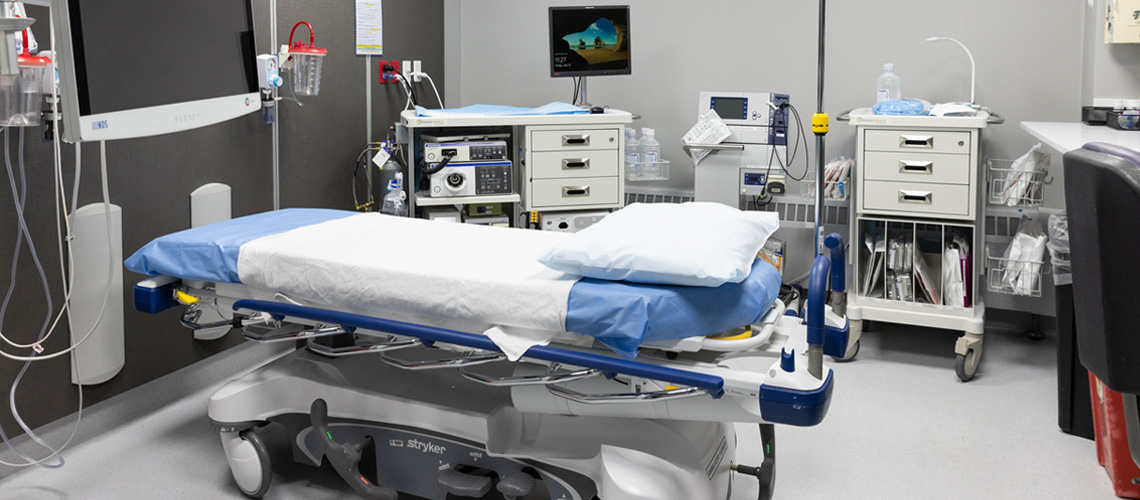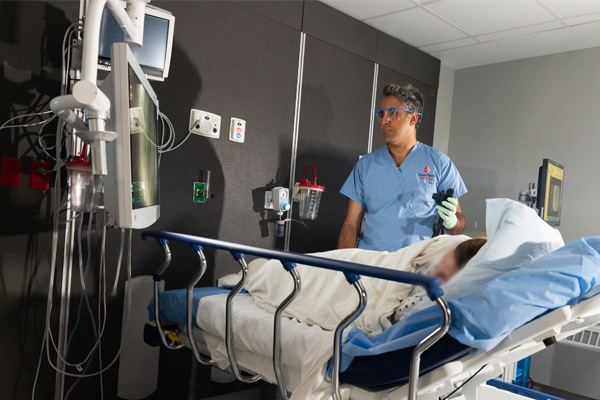Providing specialized care for digestive and liver diseases on the East End of Long Island.
The only endoscopy unit on the South Fork in a hospital-based setting.
Our comprehensive endoscopy unit has been providing world-class care, close to home, for patients on the East End of Long Island, since 2012. When entering the hospital for a procedure, patients are welcomed into a safe and private environment, where they are treated like family.
Stony Brook Southampton Hospital is a recipient of the Quality Recognition Award from the American Society for Gastrointestinal Endoscopy (ASGE), which is a testament to the unit’s exceptional care and professional delivery of service that has been provided to our patients for over a decade.

As a leading specialist in gastroenterology and hepatology on Long Island, our state-of-the-art endoscopy unit has cared for more than 23,000 patients and continues to provide cutting edge services to our community.
Gastroenterology and Hepatology Services Offered at Stony Brook Southampton Hospital:
- Colonoscopy
- Upper Endoscopy
- Flexible Sigmoidoscopy
- Biopsy
- Polyp Removal
- Bile Duct Stenting
- PEG Tube Management (percutaneous endoscopic gastrostomy)
- ERCP (endoscopic retrograde cholangiopancreatography)
*Stony Brook Southampton Hospital is the only site on the East End offering this procedure - Wireless Esophageal pH (Bravo) Test

Why Choose Stony Brook Southampton Hospital
Our patients are treated with respect and compassion by a team of dedicated gastroenterologists whose joint goal is to provide the safest and most effective treatments available. We specialize in prevention, treatment and diagnosis, with our patients needs as top of mind.
Close to Home:
If you are local to the East End, our services are in key towns across the South Fork, with our procedures being centrally performed in Southampton. We are 35-miles from the tip of Montauk and 25 miles from Westhampton, the gateway to the Hamptons. Public transportation is located near the hospital.
Hospital-Based Setting:
By having our endoscopy suites inside the hospital, it ensures patients peace of mind as all medical resources are readily available in case of an emergency, as well as an anesthesiologist present throughout your entire procedure.
Personalized Care:
Our team of medical professionals work hand-in-hand with the patients they care for, starting at their very first visit. We approach your treatment in a collaborative way with your physician being your strongest advocate and guide.
Exceptional Team:
Meeting House Lane Medical Practice’s gastroenterologists are a part of a departmental team providing cohesive care across all patient panels. They work closely with all hospital staff while performing procedures and providing their services with inpatient consults.
Placing patients at the center of their decision-making process, being an approachable physician and fully informing them of all their options, is at the heart of what I do. I want each of my patients' experience to be individualized in care and for them to feel comfortable expressing how they feel when they are with me. Providing this quality of care is what I strive for every day.
— Dr. Ahsan Khan, Gastroenterologist
Trust your gut, get checked when you know something’s up.
Gastroenterological diseases affect the mouth, esophagus, stomach, small and large intestines.

Common GI symptoms include:
- abdominal pain
- diarrhea
- constipation
- rectal bleeding
- loss of appetite
- vomiting
- weight loss
- bloating, excess gas and heart burn.
Did you know that your gut health impacts your overall well-being?
The foundation for your health starts in the gut. Studies show that digestion can directly influence our mood and health, depending on the foods we eat. The GI tract is primarily where your food is digested, and nutrients are absorbed, which is why it’s important to eat a nutritious diet filled with fiber. When you feel your best, you’re at your best.
I profoundly believe that gut microbiome and gut brain axis are essential components of overall well-being of a person, and that’s something I tend to incorporate in my life as well as the lives of my patients”
— Dr. Gaurav Bhardwaj, Gastroenterologist

Gastroenterology and Hepatology conditions treated:
- Acid Reflux (GERD)
- Abnormal Liver Function Tests
- Autoimmune Hepatitis
- Barrett’s Esophagus
- Celiac Disease
- Chronic Constipation
- Cirrhosis
- Collagenous Colitis
- Colon Cancer
- Colon Cancer Screening
- Crohn’s Disease
- Diarrhea
- Dysphagia (Difficulty Swallowing)
- Eosinophilic Esophagitis
- Familial Colon Cancer
- Hepatitis B
- Hepatitis C
- Irritable Bowel Syndrome (IBS)
- Inflammatory Bowel Disease
- Liver Cancer (Hepatocellular Carcinoma)
- Lymphocytic Colitis
- Microscopic Colitis
- Peptic Ulcer Disease
- Primary Biliary Cirrhosis/Cholangitis
- Primary Sclerosing Cholangitis
- Small Intestinal Bacterial Overgrowth
- Ulcerative Colitis
60 to 70 million Americans are affected by gastrointestinal (GI) diseases and disorders each year.
Colon Cancer Screening Advisory
Colorectal cancer is the third most commonly diagnosed cancer amongst men and women and is the second leading cause of cancer death. Often, the symptoms for colorectal cancer are no symptoms at all, which is why it’s imperative to follow the screening guidelines for optimal diagnosis and treatment.
Starting at the age of 45, it is recommended for men and women to begin screening for colorectal cancer. Depending on your results from your initial colonoscopy and other health factors, you can proceed to screen for colorectal cancer every 10 years after your initial scope.
Patients are at an increased risk for colorectal cancer if they have family history, a personal history of inflammatory bowel disease, colorectal cancer or certain types of polyps. In some cases, your physician may recommend you begin your screening before the age of 45.
I am dedicated to providing compassionate and comprehensive care for a diverse community of patients with gastrointestinal diseases, emphasizing the critical need for colorectal cancer screening to ensure early detection and better outcomes for all.
— Dr. Ana Martinez-Tapia, Gastroenterologist
Don’t let fear stand in the way of your diagnosis. Click here to learn more from our experts.
